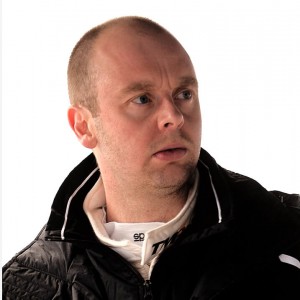… A Co-driver’s View of Mull …
Amongst all the excited talk of cars and drivers ahead of this year’s Beatson’s Mull Rally, there is one vitally important element often overlooked by fans and followers. The Co-driver.
Arguably his or hers is the most difficult job. After all, the driver only has to turn the steering wheel, move the gearstick about a bit and stab the brakes every now and again. Whereas the Co-driver has the task of reading out the Notes for the duration of each stage, coherently and at the right pace, and without losing the plot. He/she also has to manage the time schedule, check the Time Cards at the end of each stage, calculate fuel consumption, keep on top of mileages and conditions to help the driver make the right tyre choice and ensure that the service crew knows where to be and how much time they have at each stop. As the rodent says: “Simples!”
And then there is the saying: “Drivers win rallies, co-drivers lose them!” but as we all know, that is very far from the truth.
These unsung heroes and heroines are a vital part of the sport – especially on Mull, but just how big a challenge does Britain’s only ‘mainland’ closed public road rally (apart from Isle of Man and NI) pose to the amateur crews who make the pilgrimage.
 Twice winner of the event, Daniel Barritt (in 2007 with Neil MacKinnon, and 2008 with Paul MacKinnon) is the ideal chap to ask, especially since he did 3 seasons with Elfyn Evans and M-Sport on the World Rally series, and won the SCCA Pro Rally title with David Higgins in 2002 and 2003 in the USA – that’s on the far west side of Mull by the way.
Twice winner of the event, Daniel Barritt (in 2007 with Neil MacKinnon, and 2008 with Paul MacKinnon) is the ideal chap to ask, especially since he did 3 seasons with Elfyn Evans and M-Sport on the World Rally series, and won the SCCA Pro Rally title with David Higgins in 2002 and 2003 in the USA – that’s on the far west side of Mull by the way.
These days Daniel is co-driving for a Japanese driver with Tommi Makinen Racing, but he’s taking time out to come back to Mull this year to sit with Paul MacKinnon.
“When I first came over here with my Dad as a kid, I was just 16,” recalled Daniel, “and I wondered just how the hell will I ever manage this?”
Well, he did, and 20 years later he is regarded as one of the world’s top co-drivers, so just how does this ‘wee clubbie event’ off the wild and west coast of Scotland stack up against the world’s finest?
“Each rally in the WRC is different and has a different challenge,” said Daniel, “and in some respects Mull is just like that, another event with another challenge. However, the difficulty of the stages is very like the difficulty level on some WRC rounds. You can’t compare it with Corsica though. Over there it’s corner after corner after corner for three days, but on Mull you get the occasional straight to draw breath. It’s also quite long compared to other British rallies, the challenge is definitely there on Mull. It’s an excellent proving ground for aspiring co-drivers.”
“I used to think that Mull was the hardest place to read Notes,” he added, “It’s still hard but there are harder places. I was up last weekend for the first time in about 8 years. Fortunately, I’m with Paul who knows the island and the roads, and we’ve worked together before, so brushing up the Notes and getting back up to speed will be relatively straightforward for us. He still uses Notes and he does listen.”
When asked about their system, Daniel explained: “We’ll be using the standard 1 to 9 number system where 1 is flat and 9 is 90 degree corner.”
As for advice for newcomers and the more ambitious, Daniel had some words of advice: “One page of Notes per kilometre is a good rule of thumb, but people should start at their own comfort level. It’s very easy to lose the place if Notes are lengthy and complicated, so the less experienced should try and make use of landmarks along the route, like, poles, rocks, lay-bys and bushes in order to keep their place. It’s so easy to lose the place on a fast, busy rally.”
Co-drivers should also discuss (and agree!) with their driver before any event about speed of delivery, and whether one corner ahead or two, and not to get carried away, which is all too easy to do when the adrenalin starts coursing through the veins.
“It’s all about teamwork,” said Daniel, “This can be practiced on local roads that you know, obviously within speed limits, and helps with the delivery of the Notes and working with the driver on an actual event. You can’t beat practice. Even the professionals practice between rallies. You’re always looking for the edge, an advantage, something new that will help, and you never stop learning.”
So there you have it. From someone who knows. Start slow and build from there, but keep practicing. Rallying at this level is very much a team effort. Mull is one the most arduous and technically demanding rallies on the amateur circuit. If you can master that, then the WRC is a doddle.
**